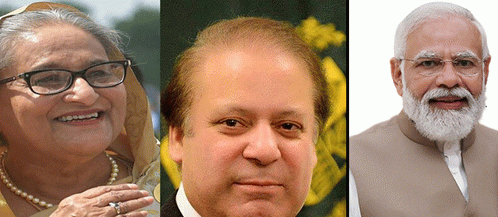Three countries in the sub-continent, once part of united India before August 1947, go to the polls early next year within weeks of each other. It is a remarkable coincidence.
Bangladesh polls are due in January 2024, followed by Pakistan a month later in February, and India will elect its new Parliament a couple of months later though speculation is that the ballot may be advanced as the ruling BJP of Prime Minister Narendra Modi seeks to cash in on favorable winds.
The polls for the 350-member Bangladesh Parliament appear to be the most controversial of the three. The main opposition party, the Bangladesh Nationalist Party (BNP) headed by ailing Khaleda Zia, has announced poll boycott; 10,000 of its workers are reported to have been jailed after street violence that has become endemic with the police allegedly playing a partisan role.
BNP's boycott decision was a response to Sheikh Hasina government's refusal to appoint a caretaker government to supervise the polls. Bangladesh has a tradition of neutral regime during poll time.
A Supreme Court order in 2011 asked for some amendments in the rules and for the Awami League this was a good excuse to do away with the neutral poll umpire.
Also, because of the bitter experience of the past when a caretaker government assumed military control of the country and arrested a number of political leaders, Hasina and Khaleda including.
Terry Isley, a member of an independent election monitoring delegation that visited Dhaka in August 2023, said that the demand for a caretaker government is "unconstitutional and illegal in the present political context of Bangladesh".
The international community is concerned about the fairness of the polls and the rights of the citizens. Firstly because of what a group of human rights organizations in their letter to American Congress leaders termed as the flip-side of BNP.
"BNP and its ally Jamaat-e-Islami, a far-right Islamist party, have been operating 'overtly and covertly in cahoots with terrorist groups, like Ansar al Islam', since 2001", according to them.
Secondly because the BNP is known for its links with Islamist militant groups like Jamaat ul-Mujaheddin (JuM) and Harkat-ul-Jihad (HuJ).
Over 100 Nobel laureate, and nearly 100 global leaders, have also expressed concern over the Bangladesh situation.
The Biden administration announced on May 23, 2023, that visas would be denied to any Bangladeshi "believed to be responsible for, or complicit in, undermining the democratic election process in Bangladesh".
The policy lists actions that would undermine the election process as "vote rigging, voter intimidation, the use of violence to prevent people from exercising their right to freedoms of association and peaceful assembly".

B'desh Primer and Awami League supremo-Sheikh Hasina
(Image by Commonwealth Secretariat from flickr) Details DMCA
(Note: You can view every article as one long page if you sign up as an Advocate Member, or higher).






